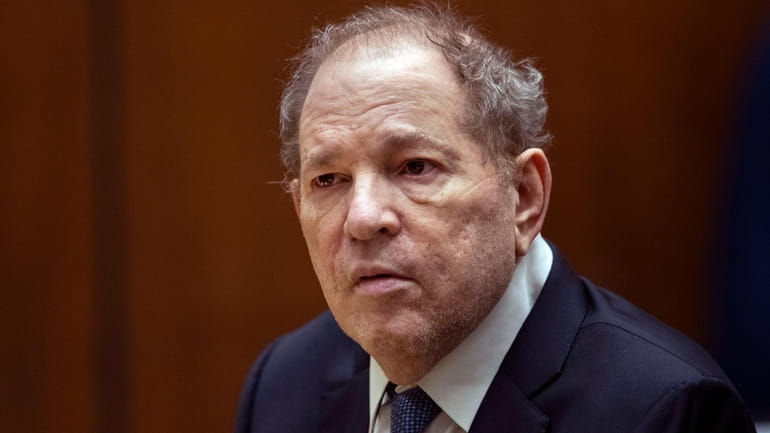New York appeals court overturns Harvey Weinstein's 2020 rape conviction from landmark #MeToo trial

Former film producer Harvey Weinstein appears in court in Los Angeles, Oct. 4, 2022. Credit: AP/Etienne Laurent
ALBANY — New York’s highest court overturned Harvey Weinstein’s 2020 rape conviction Thursday, saying the trial judge in the landmark #MeToo case prejudiced the ex-movie mogul with improper rulings — including allowing women to testify about allegations that weren’t part of the case.
The Court of Appeals ordered a new trial in a 4-3 decision that broke along what has become its established liberal-conservative lines.
The court’s conservative bloc said its colleagues continued the “disturbing trend” of overturning verdicts in sexual violence cases. Prosecutors said they will seek to re-try the case.
Weinstein, 72, was convicted of a criminal sex act for forcibly performing oral sex on a TV and film production assistant in 2006, and rape in the third degree for an attack on an aspiring actress in 2013. He was sentenced to 23 years in prison.
WHAT TO KNOW
- The state Court of Appeals overturned Harvey Weinstein’s 2020 rape conviction Thursday, saying the trial judge in the landmark #MeToo case prejudiced the ex-movie mogul with improper rulings.
- The court ordered a new trial in a 4-3 decision that broke along what has become its established liberal-conservative lines. Prosecutors said they will seek to re-try the case.
- The court’s conservative bloc said its colleagues continued the “disturbing trend” of overturning verdicts in sexual violence cases.
But he’s headed for a new trial after the judge in the case made decisions that “undermined” Weinstein’s ability to present a defense, the Court of Appeals ruled.
“Every person accused of a crime is constitutionally presumed innocent and entitled to a fair trial and the opportunity to present a defense,” Judge Jenny Rivera wrote for the liberal majority on the bench. Where the lower court erred, she wrote, was in allowing testimony that should have be inadmissible against a criminal defendant.
“We conclude that the trial court erroneously admitted testimony of uncharged, alleged prior sexual acts against persons other than the complainants of the underlying crimes because that testimony served no material non-propensity purpose,” Rivera wrote. “The court compounded that error when it ruled that defendant, who had no criminal history, could be cross examined about those allegations as well as numerous allegations … The remedy for these egregious errors is a new trial.”
Weinstein will remain in prison — he has been at Mohawk Correctional Facility, about 100 miles northwest of Albany, since March 2020 — because he separately had been convicted in California of another rape and sentenced to an additional 16 years in prison.
In February, the Court of Appeals heard arguments in Weinstein’s New York case and appeared torn on how his trial had been conducted.
Weinstein’s attorney, Arthur Aidala, contended the judge had trampled his right to a fair trial with pro-prosecution rulings that turned the trial into “1-800-GET-HARVEY" and made it about Weinstein's character, not the evidence.
In the end, Rivera joined with Chief Judge Rowan D. Wilson and two others in ordering a new trial.
The minority on the court wrote a pair of blistering dissents.
In one, Judge Madeline Singas, the former Nassau County district attorney, said her liberal colleagues’ decision erred by “whitewashing the facts” and “ignoring evidence of the defendant’s manipulation and premeditation.”
“By failing to recognize that the jury was entitled to consider defendant’s previous assaults, this court has continued a disturbing trend of overturning juries’ guilty verdicts in cases involving sexual violence,” Singas wrote.
Allegations by numerous women against Weinstein, the once-powerful and feared studio boss behind such Oscar winners as “Pulp Fiction” and “Shakespeare in Love,” ushered in the #MeToo movement. His New York trial drew intense publicity, with protesters chanting “rapist” outside the courthouse.
Weinstein maintains his innocence. He contends any sexual activity was consensual.
Aidala, Weinstein's attorney, called the reversal “a tremendous victory for every criminal defendant in the state of New York.”
“He did not get a fair trial and today the highest court in the state of New York agreed,” Aidala told WABC radio.
In a statement, the office of Manhattan District Attorney Alvin Bragg said: “We will do everything in our power to retry this case, and remain steadfast in our commitment to survivors of sexual assault.”
During arguments before the Court of Appeals in February, Weinstein’s lawyers asked for a new trial, but only for the criminal sexual act charge. They argued the rape charge can’t be retried because it involves alleged conduct outside the statute of limitations.
Activists and advocates called the decision “devastating” and “gutting.”
“A jury heard [the women's] harrowing accounts about abuse and believed them — and so did millions of other people in this country who were not in that courtroom," said Fatima Goss Graves, president and CEO of the National Women's Law Center. “Today’s decision does not erase the truth of what happened. It doesn’t alter the reality that Harvey Weinstein is a serial sexual abuser who exploited his power for decades.”

